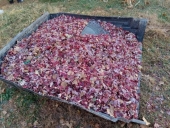Here is something I posted to a similar question last year:
"I disagree with adding a lot of wood ash to the compost heap. This will not be good for composting. Compost will almost always be more alkaline than your acidic soil, unless it is wood chip based compost, and does not need alkalizing by a bulk addition of wood ash. Wood ash is very caustic when water is added (this is how lye is made), and it will kill bacteria in your compost, and will do the same if added in concentrated amounts in your soil. I wouldn't add any to your compost at all.
It is better-Much Better-to add a dusting of wood ash on beds where plants that favor alkalinity, like beans, are going to be planted. Beans like a dusting near them for germinating. If wood ash is dusted out into your garden in a very fine way, then you are adding it as a trace mineral supplement in many tiny doses rather than as a bulk thing that would burn your plants and larger bacterial communities. The trace minerals and alkalizing of the wood ash can be a very positive amendment, but it must, like most concentrated fertilizers, be used in calculated moderation, if used at all. Compost, on the other hand, can be used pretty liberally, because it boosts the fertility through organic soil matter and microbial and fungal communities, in a much milder way. These organic substances and communities function in multifaceted symbiotic and synergistic ways to boost fertility.
I have a friend who adds a dusting of wood ash in his potting mix which has many ingredients, including peat which is acidic.
Certain crops, like potatoes, prefer an acid soil, or they will get scab on them. Scab exists in all soils but thrives in an alkaline soil.
Other crops and animals will promote alkalinity. If I'm not mistaken, legumes will help alkalize soil. Earthworms will alkalize any material that passes through them."
This quote and rest of the discussion can be found
HERE






